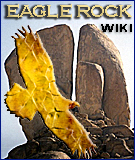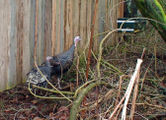Difference between revisions of "Mixed farming"
| Line 18: | Line 18: | ||
=== Agribusiness and factory farms === | === Agribusiness and factory farms === | ||
| − | Wikipedia defines agribusiness as | + | Wikipedia defines agribusiness as "a generic term for the various businesses involved in food production, including farming and contract farming, seed supply, agrichemicals, farm machinery, wholesale and distribution, processing, marketing, and retail sales."<ref>[http://en.wikipedia.org/wiki/Agribusiness Agribusiness - Wikipedia]</ref> Companies that are part of agribusiness produce agricultural machines and herbicides and pesticides and genetically modified seeds that have changed how agriculture is done around the world. |
== Self-sustenance and close relationship to nature == | == Self-sustenance and close relationship to nature == | ||
Revision as of 19:34, 2 July 2012
- Topic in Gardening courses. By John Eagles.
- This page is under construction.
A mixed farm is one where both crops and animals are cultivated and where crops are grown at least partly at the service of the livestock. A typical mixed farm would be one in which various animals are held, such as cows, goats, pigs, poultry. The manure is used to fertilize the land where all kinds of crops, grass, rye, wheat, turnips, legumes, etc. are grown. Many of these products are used for the family of the farmer but some would be sold at markets.
Modern agriculture is more and more becoming a large-scale business in which one farmer only has a dairy farm or only grows a few crops on big fields. For typical present-day dairy farms, mostly the only mixed element is that maize and grass silage are fed to the cattle.
Changing agriculture: from small family farms to large companies
- Huge dairy farms with up to 40,000 cows
- Agribusiness - http://en.wikipedia.org/wiki/Agribusiness
- Family farm - http://en.wikipedia.org/wiki/Family_farm
- Factory farm - http://en.wikipedia.org/wiki/Factory_farming
Family farms
In much of human history and in most developing nations today, farms were owned and operated by families. In many cases these had or have the form of mixed farms.
Agribusiness and factory farms
Wikipedia defines agribusiness as "a generic term for the various businesses involved in food production, including farming and contract farming, seed supply, agrichemicals, farm machinery, wholesale and distribution, processing, marketing, and retail sales."[1] Companies that are part of agribusiness produce agricultural machines and herbicides and pesticides and genetically modified seeds that have changed how agriculture is done around the world.
Self-sustenance and close relationship to nature
Ecovillages
Ecovillages[2] are planned residential communities with the goal of becoming more socially, economically and ecologically sustainable. Ecovillage members are united by shared ecological, social-economic and cultural-spiritual values. An ecovillage is often composed of people who have chosen an alternative to centralized electrical, water, and sewage systems. Intentional communities are somewhat similar to mixed farms but they usually are managed by communities rather than one family.
Robert Gilman, one of the initiators of the ecovillage movement has defined an ecovillage as a "human-scale full-featured settlement in which human activities are harmlessly integrated into the natural world in a way that is supportive of healthy human development, and can be successfully continued into the indefinite future."[3]
The Global Ecovillage Network is a global association of people and communities of ecovillages. Network members share ideas and information, transfer technologies and develop cultural and educational exchanges.[4]
One of the pioneering ecovillages in the world is Findhorn Ecovillage.[5]
Gallery
See also
References
- ↑ Agribusiness - Wikipedia
- ↑ Ecovillage - Wikipedia
- ↑ The Eco-village Challenge The challenge of developing a community living in balanced harmony - with itself as well as nature - is tough, but attainable. By Robert Gilman.
- ↑ Global Ecovillage Network
- ↑ Findhorn Ecovillage


